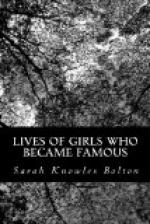At the next school, at Coventry, Mary Ann so surpassed her comrades that they stood in awe of her, but managed to overcome this when a basket of dainties came in from the country home. In 1836 the excellent mother died. Mary Ann wrote to a friend in after life, “I began at sixteen to be acquainted with the unspeakable grief of a last parting, in the death of my mother.” In the following spring Chrissy was married, and after a good cry with her brother over this breaking up of the home circle, Mary Ann took upon herself the household duties, and became the care-taker instead of the school-girl. Although so young she took a leading part in the benevolent work of the neighborhood.
Her love for books increased. She engaged a well-known teacher to come from Coventry and give her lessons in French, German, and Italian, while another helped her in music, of which she was passionately fond. Later, she studied Greek, Latin, Spanish, and Hebrew. Shut up in the farm-house, hungering for knowledge, she applied herself with a persistency and earnestness that by-and-by were to bear their legitimate fruit. That she felt the privation of a collegiate course is undoubted. She says in Daniel Deronda: “You may try, but you can never imagine what it is to have a man’s force of genius in you, and yet to suffer the slavery of being a girl.”
She did not neglect her household duties. One of her hands, which were noticeable for their beauty of shape, was broader than the other, which, she used to say with some pride, was owing to the butter and cheese she had made. At twenty she was reading the Life of Wilberforce, Josephus’ History of the Jews, Spenser’s Faery Queen, Don Quixote, Milton, Bacon, Mrs. Somerville’s Connection of the Physical Sciences, and Wordsworth. The latter was always an especial favorite, and his life, by Frederick Myers in the Men of Letters series, was one of the last books she ever read.
Already she was learning the illimitableness of knowledge. “For my part,” she says, “I am ready to sit down and weep at the impossibility of my understanding or barely knowing a fraction of the sum of objects that present themselves for our contemplation in books and in life.”
About this time Mr. Evans left the farm, and moved to Foleshill, near Coventry. The poor people at Griff were very sorry, and said, “We shall never have another Mary Ann Evans.” Marian, as she was now called, found at Foleshill a few intellectual and companionable friends, Mr. and Mrs. Bray, both authors, and Miss Hennell, their sister.
Through the influence of these friends she gave up some of her evangelical views, but she never ceased to be a devoted student and lover of the Bible. She was happy in her communing with nature. “Delicious autumn,” she said. “My very soul is wedded to it, and if I were a bird, I would fly about the earth, seeking the successive autumns.... I have been revelling in Nichol’s Architecture, of the Heavens and Phenomena of the Solar System, and have been in imagination winging my flight from system to system, from universe to universe.”




